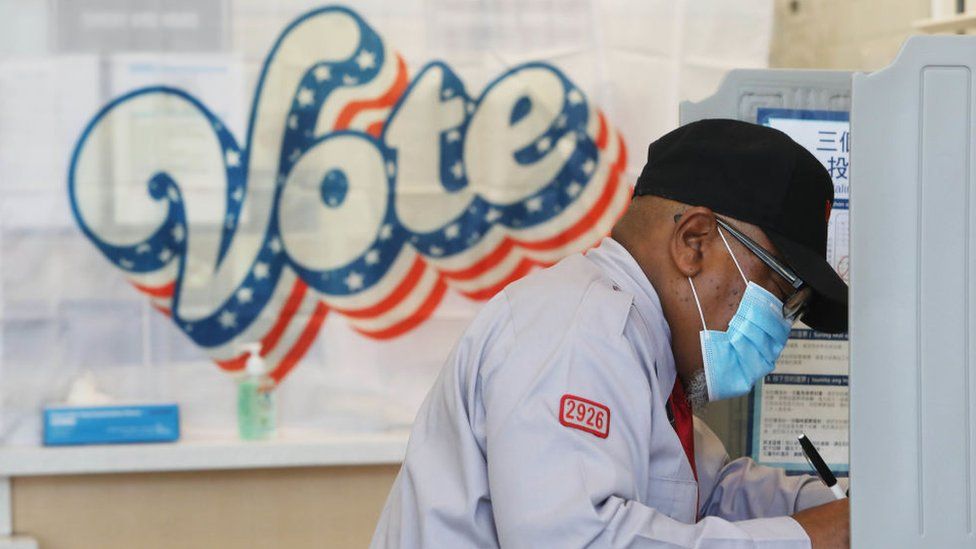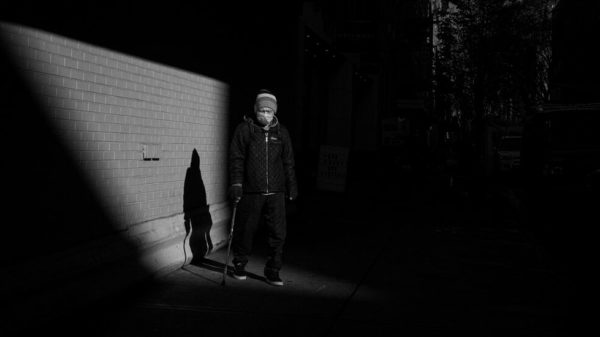President Joe Biden has suggested the US mid-term elections in November could be “illegitimate” if laws limiting voting rights are implemented.
A number of restrictions have already been adopted, mostly in Republican states, with more changes proposed across the country.
Republicans say these new laws are needed for election security.
What laws have been put in place?
Voting rights were expanded across the US before the 2020 election as states tried to make it easier and safer for people to vote during the pandemic.
Voter turnout reached record levels, and since then, many states have made these legal changes permanent.
Twenty-five states expanded voting rights in 2021, according to a report by the Brennan Center for Justice.
But 19 states have passed laws that actually restrict voting – more than in any year since monitoring began a decade ago.

“Most of the states that usually vote Democratic are making it easier to vote,” says Elaine Kamarck, who specialises in voting rights at US research group Brookings. “And most of the states that would go Republican are making it harder to vote.”
Republican lawmakers have proposed hundreds of bills that seek to limit Americans’ voting options, and dozens of these measures have already passed into law.
These restrictive measures include:
- Shortening voting times
- Reducing the number of voting locations
- Expanding voter ID requirements
- Limiting mail-in (postal) voting
- Removing inactive voters from voter rolls
- Increasing voter supervision
Some of the most wide-ranging voting restrictions have been in the Republican-controlled states of Texas, Georgia, Iowa and Florida.
These include a law in Texas under which election officials can be charged with a crime and face up to two years in jail for sending mail-in ballots to people who did not specifically request them.
“What is more crucial is the 10 or 12 states that are usually in play in an election, where there are still battles going on,” says Ms Kamarck.
For example, in Michigan, Republican lawmakers have been prevented by the Democratic governor from introducing a law severely limiting access to mail-in ballots.
In Arizona, a state Donald Trump lost by fewer than 11,000 votes, two laws curbing voting rights have been passed.
One requires any ballot cast in the wrong area to be discarded, even if the person was eligible to vote elsewhere, and the other makes it a crime for anyone other than a family member or carer to submit another person’s early ballot.
In Georgia, another state where Mr Trump lost narrowly in 2020, a law has been passed that limits the number of early-ballot drop boxes and also restricts their location to just inside election offices or early-voting sites.
Why have these laws been put in place?
Following the 2020 election, Mr Trump claimed there had been widespread voter fraud, which he said led to President Biden winning.
Republicans say new laws are needed to restore election integrity – but there is no evidence that voter fraud had any effect on the 2020 election, despite several investigations and audits.
A review by Associated Press of every potential case of voter fraud in the six battleground states disputed by Mr Trump found fewer than 500 contested ballots.
President Biden won those states by a combined total of more than 300,000 votes – so the disputed ballots represent just 0.15% of his victory margin in those states.
There have also been several audits and recounts in key states which reaffirmed President Biden’s win.

In particular, Republicans have taken aim at mail-in voting, which was expanded to make it easier to vote during the pandemic.
But there is no evidence mail-in voting led to increased fraud in the 2020 election.
Federal Election Commission head Ellen Weintraub has said: “There’s simply no basis for the conspiracy theory that voting by mail causes fraud.”
Some Republicans have also expressed concerns that a permanent expansion of mail-in voting would favour Democrats – but numerous studies have found little evidence that postal ballots help one party over another.
Which voters will be most affected?
About 23% of eligible voters live in states that have restricted voting laws in the past year, according to campaign group Voting Rights Lab – about 55 million Americans.
“There’s this fault line developing… Where you live dictates your access to the country’s democracy,” says the group’s Liz Azores.
The Brennan Center for Justice says some restrictive laws make it harder for people with disabilities and language-access barriers to vote, as rules on providing ballot assistance have been tightened.
ID restrictions also disproportionately affect poorer communities, says Ms Kamarck. “A lot of poor people don’t have a driver’s licence because they don’t have a car.
“Every restriction you place on people’s ability to vote hits poor people harder and more directly because rich people have more time and access to manoeuvre through a bureaucracy.”














